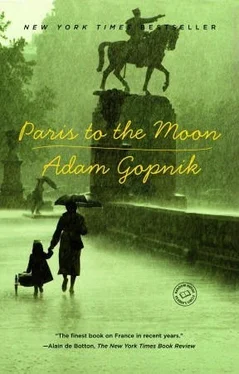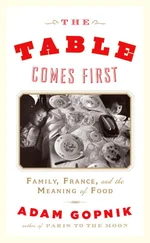I felt blue. Without the regular guys it was not the same place. They had an English menu now, and they forced it on me when they heard me speak in English to Luke. I told them to take it away and bring me the proper menu. The new garcon looked haughty and insulted.
I spoke to Lorenzo and Claude on the phone that week, and everyone agreed that this was the best thing for everyone: There was no sense in allowing the personnel to hang on waiting for some quixotic scheme for a new Balzar to hatch—though, they both added quickly, hatch it might, hatch it might. We rung off.
I stopped going to the Balzar. The food was fine, I was told, and I would still send visiting Americans there. But I no longer loved it, and without Jean-Pierre welcoming us, it was not the same place. Fortunately a good cookbook had appeared—by the American Daniel Young—with a couple of Balzar recipes that I liked, and I would stay home and make them for my family on Sundays: gigot d’agneau avec flageolets and profiteroles.
Then, one night at the beginning of May, I got a call from Claude. How was Madame and the heritier ? Fine, fine, how was he? Oh, it was going for him. Listen, he said, the old guys had decided to come together for a night and give a dinner of their own for the people who had helped them in their fight. They would love to have us. Could we join them? Yes, of course, I said. We wouldn’t miss it for the world. He gave me the date a couple of weeks off, at the end of May, and the address of a restaurant up in the Ninth, the Relais Beaujolais. The owner was a friend and was glad to be hosting the dinner.
By then Martha was already five months pregnant and very big, and it was a hot and humid night. It was a nice place, though, and we arrived at eight-thirty. There were two or three big tables set up, with familiar faces all around them. Everyone was there:
Claude and Guy and Lorenzo…. All the garcons of course were in plain clothes, jeans and short-sleeve shirts mostly. There was a lot of chilled Beaujolais and a dinner of piece de boeuf chasseur, roast beef in a mushroom-wine sauce.
The startling and instructive thing was that the garcons seemed, on the whole, happy, free, and content. They were genuinely philosophical, in the old-fashioned sense, about what had happened—meaning stoic but articulate. They could see their own situation against a broader background.
I sat across from Robert, one of the oldest of the old garcons, a small, mustached man in his late fifties. “A handful of cherries?” he said when I repeated, a little dolefully, Guy’s comment. “Perhaps. But a handful of cherries is better than an empty hand.” He was in a rust-colored short-sleeve shirt, and his mustache was turning white. “Anyway, it is only in moments of crisis that we find lucidity about ourselves—though only after the crisis is over. Still, that’s enough lucidity for anyone. Anyway, it is all the lucidity that life will give you. The crucial thing is that it was our choice. We made it. We chose to leave. I’m rather old to do this. The younger fellows… but it’s over, we made a good choice. And it was our choice.”
We talked about more general subjects: Corsica, the Clinton affair. “We can’t understand your society,” he said, shaking his head, “at once so violent and so puritanical, so authoritarian and so anarchist.” But of course, it turned out that he had someone, a son, in America, who was always inviting him over. He had been once and was going to go again. He liked it there.
“I love to study the problem of being,” he added abruptly, and he told a long and tragic story about one of the other personnel, a maitre d’ who had worked at the Balzar once, whose daughter, the light of his life, had committed suicide. Her father could not stop thinking of it and talking about it, all the time, his grief so deep, while he gave orders and cleaned tables. Though I knew him, in my callowness I had never sensed the tragedy of this man.
“His problem,” Robert went on gravely, “was that he could not arrive at an abstraction of himself, only at a version of me, a me in some other form. He could not see himself as he was, see himself from outside himself. He was trapped in himself from the failure to make himself into an abstraction.”
I looked up. Lorenzo was shaking hands and I could see was being urged to make a speech, a toast, but he was politely declining, smiling and shaking his head. La guerre est finie.
“That’s a formidable guy,” Robert said, nodding at Lorenzo. “Once he is wound up, ah, he can go on brilliantly, passionately. And Claude too. We were lucky to have them.”
I thought the most irritating thing about life in France, as I had described it so sapiently to the readers of Le Monde— the insistence on the primacy of the unspecific, on turning things into abstractions of themselves at every turn—was a gift. The civilization I had praised, and the culture exasperated me, and by civilization, I had meant small shops, and by culture, big buildings. In the end, though, the small shops were special in Paris because they were always in the shadow of the big buildings. Take the small shops away (and the streets the shops sit on and the quartiers that the streets sit in) and you would have nothing—not Rene Clair or Trenet and Lartigue or the whole of this great and beautiful bourgeois civilization. But take away the big buildings, with their abstract ideas and grand manner, and the special quality of the Parisian shops—of the brasseries and cafés, of the glass houses and glass domes—their quality of being the stage sets of a modern drama, something more than just shops, would go too. The lucidity of Parisian empiricism was bought at the price of the grandiosity of Parisian abstraction, and you couldn’t have one without the other, no matter how much you wanted to or how hard you tried.
We finished dinner, and I asked the owner—who had been up on a ladder most of the night, fussing with the single unworking fan that was supposed to cool off the entire salle— to call us a cab. My wife was large and easily tired. But just as the owner came to tell us that the cab had arrived, Claude at last rose and began to make a presentation to Lorenzo of a single immense, earthenware tray “A gift of friendship,” he said, “of simple friendship.”
Lorenzo Valentin rose to his feet reluctantly, hugged Claude, and began to sit down. “No, say something, say something,” everyone said. He shook his head again. People began to pound the tables, as they had done at the Balzar a year ago. Now he was on his feet again, and I could see that he was about to begin.
It seemed like a good moment for us to slip away to the taxi, and we got up and tried to duck our heads down and go back up the stairs to the front room and the street. But Claude saw us going and cried out and called for a round of applause.
I stopped and turned and bowed. I had fallen in love all over again that night with the lucidity and intelligence of Parisian civilization, and I said, in my ornate, brutally accented, abstract French that we were leaving so precipitously simply to defend the health of one more child who would—that there would be a child who would be, to be born in Paris, and who would love Paris too—who would in some way be French. It was playing to the gallery, I suppose, but it got a round of applause, and I still tell myself they meant it.
We went out into the street, found the taxi waiting in the rain, and went home. From the street, as I helped Martha into the cab, I could hear the first murmur of Lorenzo’s voice, rising in interrogation, just one last time, to inquire about the complexities of ownership, the love of a lieu, the hold of memory, and the meaning of possession, as it is felt both by the possessor and by the possessed.
Читать дальше












